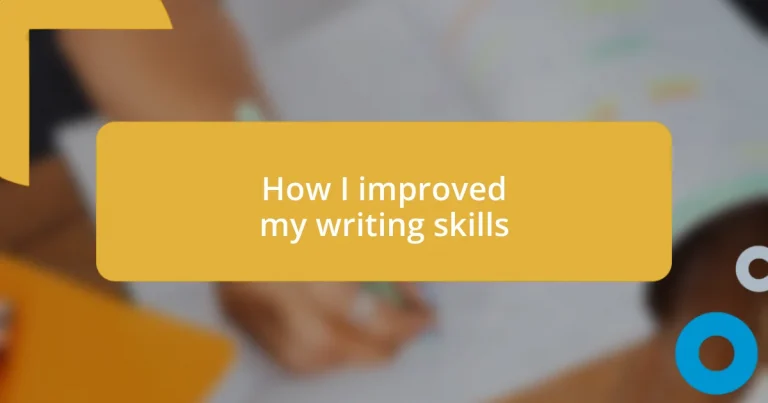Key takeaways:
- Writing serves as a powerful tool for self-expression, personal growth, and connecting with others, enhancing clarity and understanding of one’s thoughts.
- Establishing clear writing goals and a regular routine significantly improves writing consistency, creativity, and personal development.
- Seeking feedback, reading widely, practicing different styles, and continuing education are crucial strategies to refine writing skills and fuel inspiration.
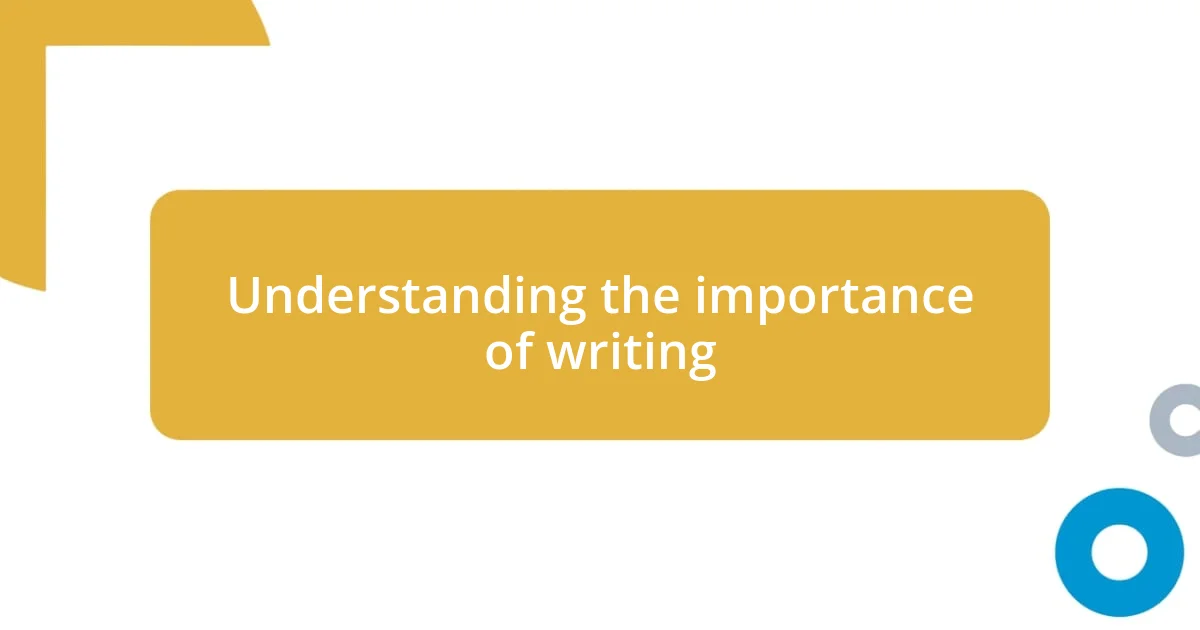
Understanding the importance of writing
Writing is a powerful tool that shapes how we communicate our thoughts and ideas. I remember the first time I penned an article that was well-received; it was like a warm wave of validation washed over me. You might wonder, how significant can writing really be in our daily lives? The truth is, it can open doors we never knew existed, allowing us to connect with others on a profound level.
I’ve often found that writing not only helps articulate my ideas but also clarifies them. During moments of doubt, I put my thoughts on paper, and suddenly, things become so much more clear. Have you ever experienced that rush of understanding when you finally write down what’s swirling in your mind? That sensation is empowering, and it demonstrates the immense value of honing our writing skills.
Moreover, I believe writing is fundamental to personal growth. Each draft I’ve written reflects where I was at that moment in my life. When I read back on those pieces, I see the evolution of my thoughts and skills, almost like a time capsule of my journey. Doesn’t the idea of capturing your growth through writing sound appealing? It’s an invaluable keepsake of your development as a person and a communicator.
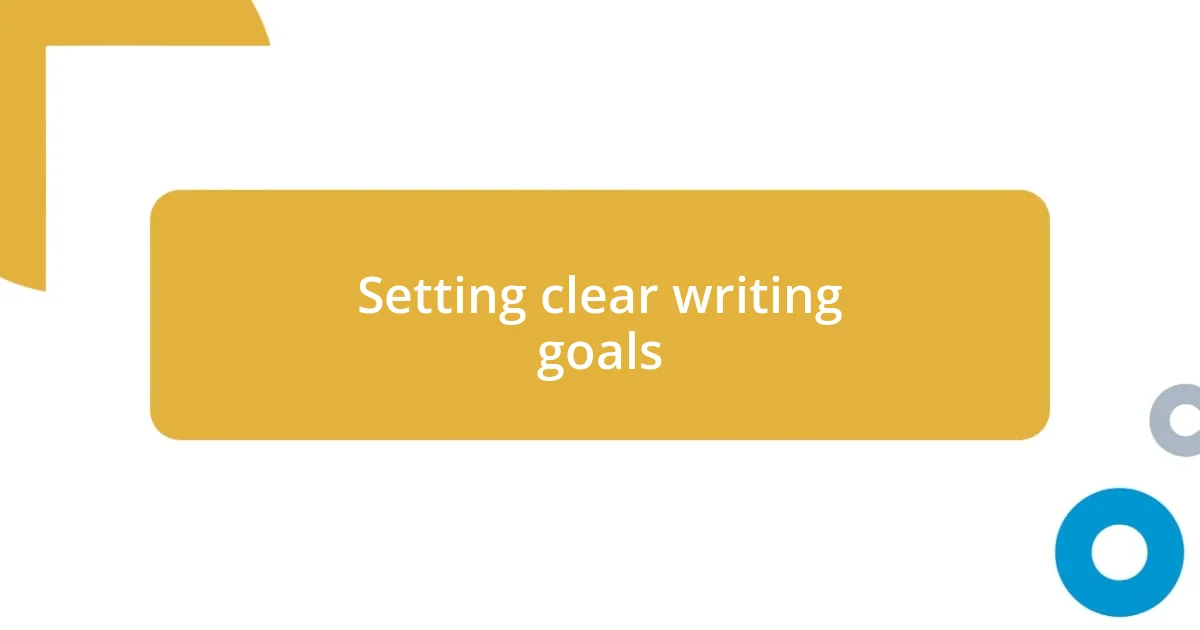
Setting clear writing goals
Setting clear writing goals has been a transformative aspect of my writing journey. Initially, I wrote without intention, which often left me feeling lost and frustrated. However, once I started to define specific goals, each writing session became more purposeful and rewarding. For example, I decided to improve my storytelling by completing a short story every month. This not only kept me committed but also allowed me to see my progress clearly.
To set effective writing goals, consider these points:
- Be specific: Instead of vague goals like “write more,” aim for “write 500 words a day.”
- Make it measurable: Track your word count or the number of pieces you complete each month.
- Set realistic deadlines: Give yourself a timeline that challenges you yet is attainable.
- Reflect on your goals: Regularly assess whether your goals still align with your writing aspirations.
- Celebrate small victories: Recognizing your achievements, no matter how small, will motivate you to keep going.
By honing in on clear goals, I’ve noticed not only an improvement in my writing but also a deeper connection to the work I produce. It’s like climbing a mountain, where each goal achieved is a new view that inspires me to continue upward.
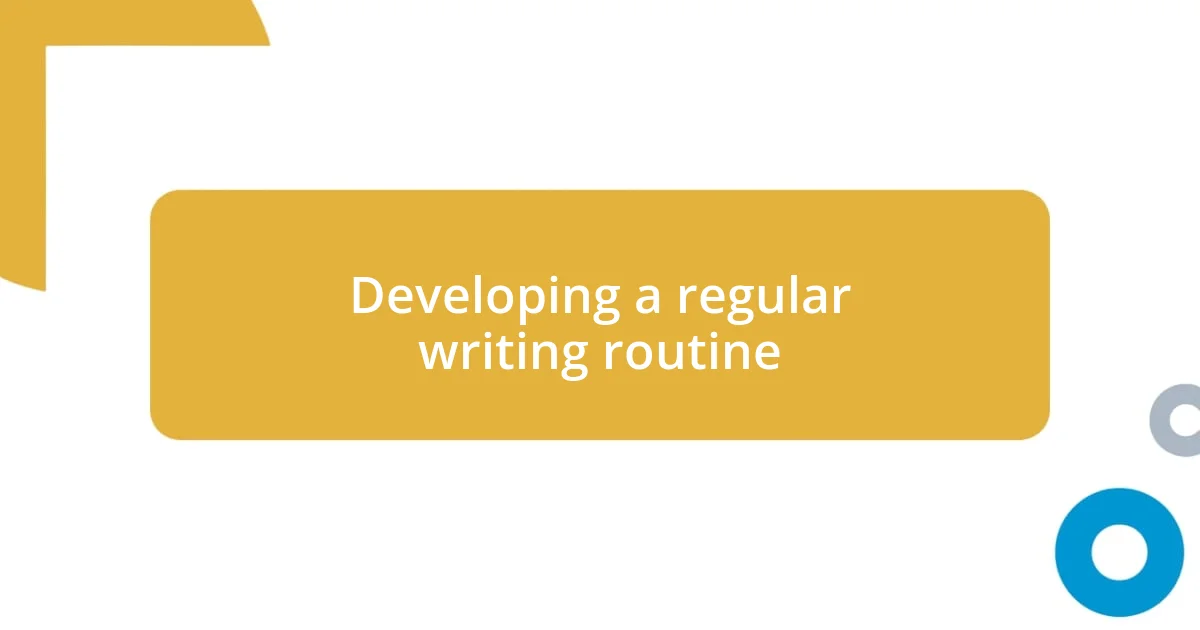
Developing a regular writing routine
Establishing a regular writing routine has been a game-changer for me. Initially, I struggled to write consistently, often scribbling down ideas sporadically. But once I committed to a schedule—like writing every morning before my day began—my creativity and productivity soared. I noticed that writing at the same time each day helped me spark my imagination more effectively than I ever expected.
There’s something about the rhythm of daily writing that gently nudges my thoughts into clarity. I remember those early mornings when the world was still quiet; that dedicated time became my sanctuary. Have you ever had that moment when you realize that the words just flow freely? It’s an exhilarating experience that can transform your feelings about writing from chore to joy.
Over time, I found that my routine also became a source of inspiration. By committing to write, I found new ideas blossoming out of everyday experiences. For instance, a simple conversation during my morning coffee could lead to a poignant story or a reflective piece. Building this routine not only nurtures my skills but also reinforces my love for writing, making it an integral part of my life.
| Aspect | Without a Routine | With a Routine |
|---|---|---|
| Consistency | Irregular and sporadic writing | Steady and predictable writing sessions |
| Creativity Flow | Frustration and creative blocks | Increased inspiration and clarity |
| Self-Discipline | Difficulty in building writing habits | Stronger writing habits developed over time |
| Personal Growth | Limited reflection on progress | Regular assessment of growth and skills |
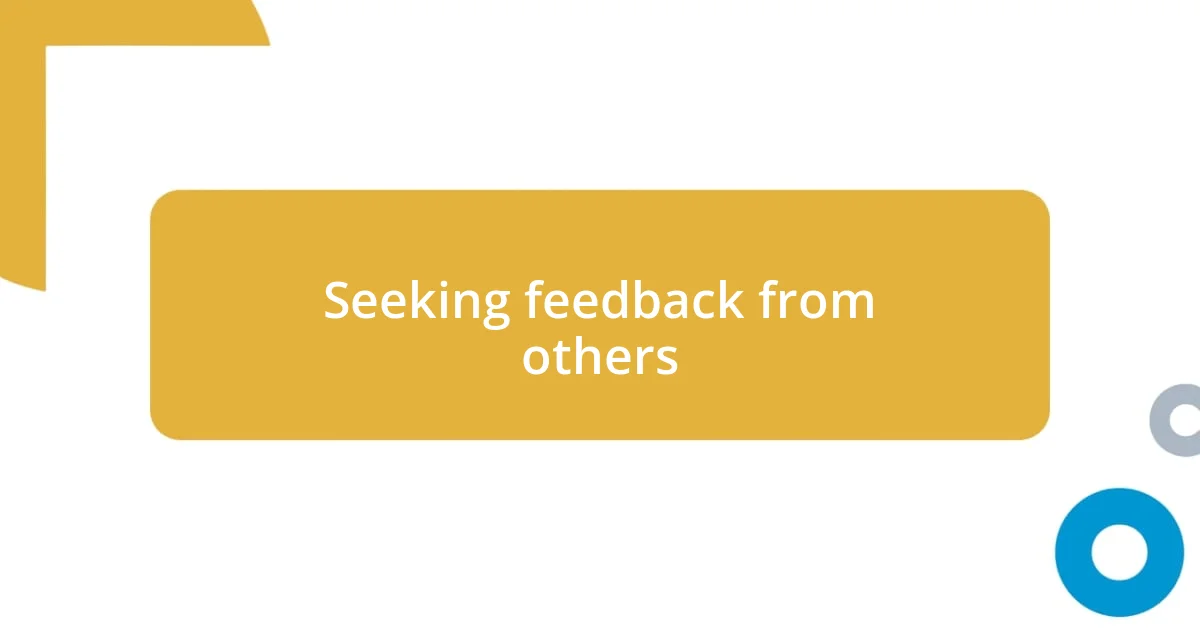
Seeking feedback from others
Seeking feedback from others has been a revelation for me in improving my writing skills. I remember sharing a draft of a short story with a close friend, who not only pointed out grammatical errors but also highlighted emotional gaps in my narrative. That conversation opened my eyes; it made me realize how valuable an outside perspective can be in shaping a more compelling story.
The process of receiving feedback can be nerve-wracking, but I’ve learned to embrace it as an opportunity for growth. When I first started sharing my work, I often felt defensive, but then I asked myself, “What if their suggestions could elevate my writing to a new level?” Now, I approach feedback with curiosity. It’s fascinating how the insights of others, whether they come from a writing group or an online community, can spark my creativity in ways I hadn’t considered.
One of the most impactful moments for me was during a writing workshop where peers critiqued each other’s work. I was struck by the supportive environment; it was refreshing to be surrounded by fellow writers who genuinely wanted to help each other improve. Their questions prompted me to think deeply about my choices, pushing me to refine my voice. Since then, seeking feedback has become an integral part of my writing process, turning what once felt like vulnerability into a robust tool for development.
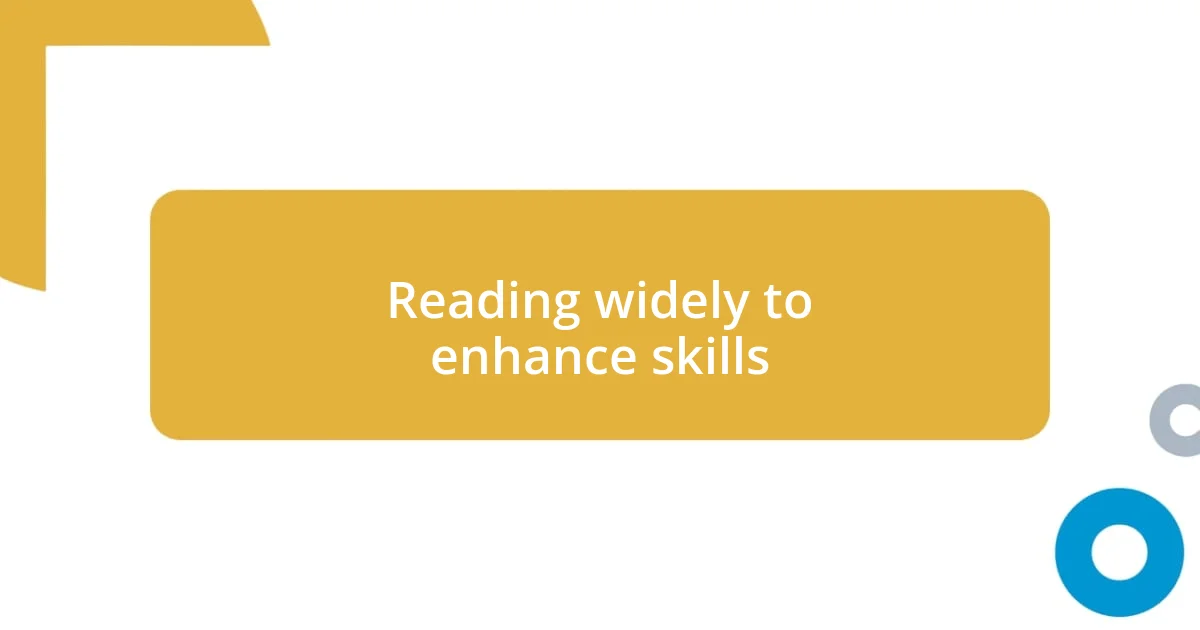
Reading widely to enhance skills
Reading widely has been my secret weapon in enhancing my writing skills. I remember picking up a novel by an author I admired and getting lost in their unique style; it was like discovering a new world. How can someone’s words paint such vivid images in my mind? This curiosity pushed me to explore diverse genres—from poetry and essays to thrillers and biographies—each offering its own flavor of storytelling and techniques.
During one summer, I challenged myself to read one book a week. It was astounding how each author’s distinct voice influenced my own writing. While diving into complex narratives, I learned how to build tension and create compelling characters. I realized that every page turned translates into lessons learned—it reshapes my perspective and expands my vocabulary. Have you ever finished a book and felt compelled to write? I find that the natural flow of inspiration comes when your mind is rich with literary experiences.
Additionally, I often find myself reflecting on what I’ve read. After finishing a story that struck a chord with me, I would sit down and analyze what made it resonate. Was it the emotional depth of the characters? Or perhaps the intricate plot? These insights lead me to consciously apply similar techniques to my own work, propelling my writing journey forward. It becomes a cycle of inspiration—reading ignites creativity, which, in turn, invites even more reading. Isn’t it fascinating how interconnected our learning experiences can be?
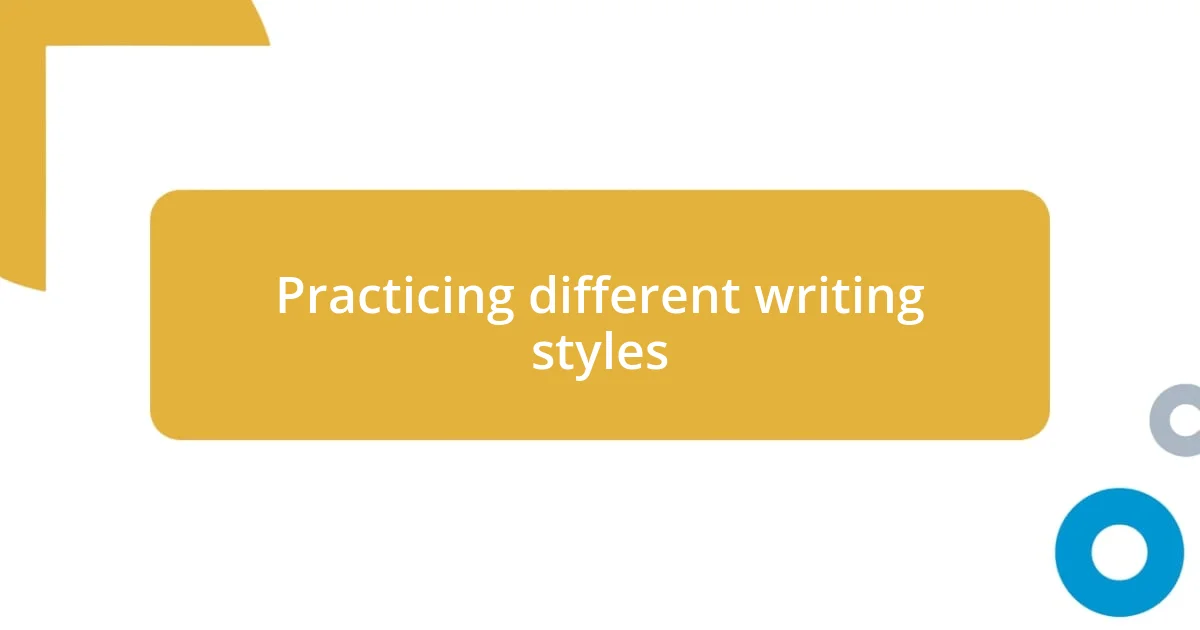
Practicing different writing styles
Practicing different writing styles has been a transformative journey for me. I remember sitting down one day, determined to step out of my comfort zone. I decided to mimic the style of a favorite author, Alex Michaelides, who weaves psychological tension masterfully. Engaging in this exercise opened my mind; it felt like trying on a new outfit that I never knew would fit so well. How often do we restrict ourselves by sticking to what we know?
One particular instance stands out. I tasked myself with writing a poem after immersing myself in the works of Maya Angelou. The rhythm of her words inspired me to explore my own feelings, evoking emotions that I often shied away from sharing. Honestly, it was liberating to experiment with line breaks and imagery, tapping into a new expressive outlet. Have you ever taken on a style that pushed you beyond your usual boundaries?
Delving into various styles allowed me to discover nuances in my voice that I hadn’t recognized before. To illustrate this, the time I wrote a short piece in a minimalist style made me scrutinize each word carefully. The challenge of being concise taught me the power of brevity and precision in language. It’s astonishing how embracing different forms can enhance your toolkit as a writer, enabling you to capture your ideas more effectively and engagingly. Don’t you think this versatility is what truly enriches our writing journey?
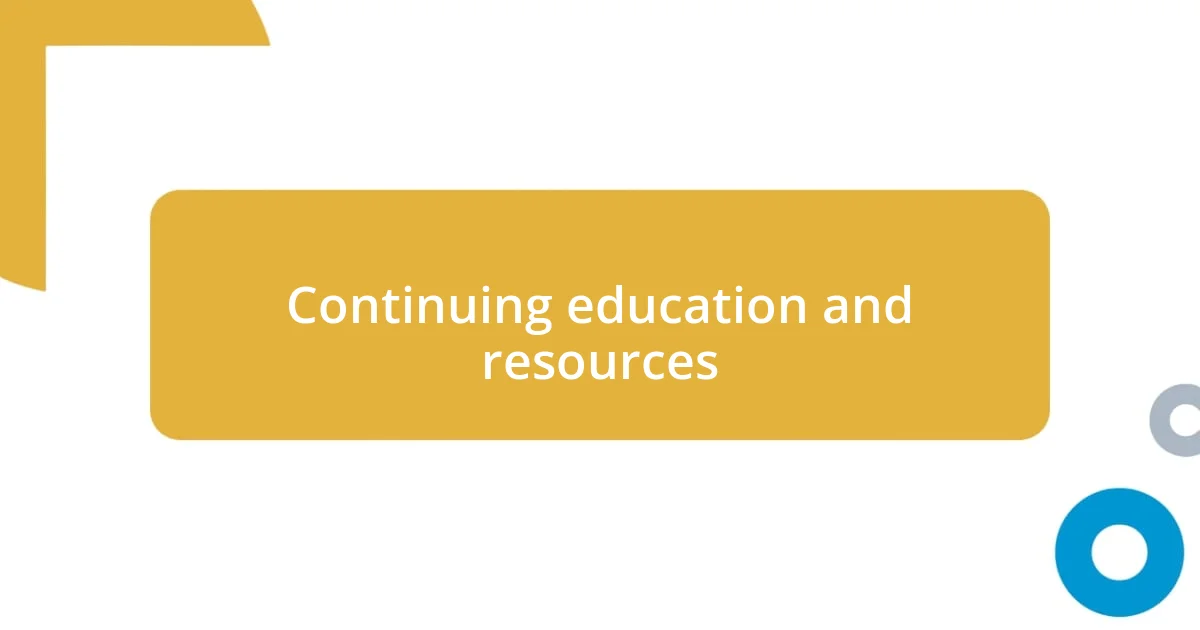
Continuing education and resources
Continuing education is essential for honing my writing skills, and I’ve embraced various resources to expand my craft. Online courses have been game-changers for me. I recall enrolling in a workshop focused on creative nonfiction that ignited my passion for personal storytelling. It made me realize how sharing my experiences not only engages readers but also offers them relatable insights.
I also frequently turn to writing communities—both online and offline—for support and feedback. Joining a local writers’ group opened my eyes to different perspectives. In one of our sessions, we exchanged pieces that touched deeply on personal topics, creating a safe space where vulnerability thrived. How often do we get to share our raw thoughts with like-minded individuals? The constructive criticism I received helped sharpen my writing and instilled confidence in my voice.
In addition to courses and communities, I often find inspiration in podcasts and YouTube channels dedicated to writing. I remember discovering a podcast where authors dissect their writing processes, and it was eye-opening. Hearing their struggles and triumphs made me realize I wasn’t alone in this journey. Have you ever listened to someone share their story and felt like it resonated with your own experiences? These resources remind me that continuous learning and engagement are vital for growth as a writer, pushing me to evolve and refine my voice.












